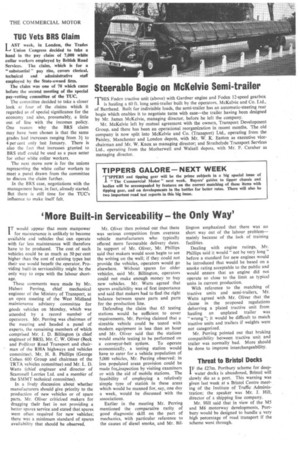'More Built-in Serviceability—the Only Way'
Page 21

If you've noticed an error in this article please click here to report it so we can fix it.
I T would appear that more manpower for maintenance is unlikely to become available and vehicles that can operate with far less maintenance will therefore have to be produced. The cost of such vehicles could be as much as 50 per cent higher than the cost of existing types but their use would benefit the operator. Providing built-in serviceability might be the only way to cope with the labour shortage.
These comments were made by Mr: Hubert Perring, chief mechanical engineer of the Ministry of Transport, at an open meeting of the West Midland maintenance advisory committee for goods vehicles on Monday, which was attended by a record number of operators. Mr. Perring was chairman of the meeting and headed a panel of experts, the remaining members of which comprised Mr. J. D. Billington (a chief engineer of BRS), Mr. C. W. Oliver (Beck and Pollitnr Road Transport and chairman of the RHA highways and vehicles committee), Mr. H. B. Phillips (George Cohen 600 Group and chairman of the TRTA vehicles committee) and Mr. L. D. Watts (chief engineer and director of ScammelI Lorries Ltd. and a member of the SMMT technical committee).
In a lively discussion about whether manufacturers should give priority to the production of new vehicles or of spare parts. Mr. Oliver criticized makers for dragging their feet in not providing a better spares service and stated that spares were often required for new vehicles; there was a minimum standard of spares availability that should be observed.
Mr. Oliver then pointed out that there was serious competition from overseas vehicle manufacturers who typically offered more favourable delivery dates. In support of Mr. Oliver, Mr. Phillips said that makers would soon begin to see the writing on the wall; if they could not provide the vehicles, operators would go elsewhere. Without spares for older vehicles, said Mr. Billington, operators could not make enough money to buy new vehicles. Mr. Watts agreed that spares availability was of first importance and said that makers had to find the right balance between spare parts and parts for the production line.
Defending the claim that 65 testing stations would be sufficient to cover requirements, Mr. Perring claimed that a sizeable vehicle could be tested with modern equipment in less than an hour and Mr. Oliver said that the stations would enable testing to be performed on a conveyor-belt system. To operate economically, a testing station would have to cater for a vehicle population of 5,000 vehicles, Mr. Perring observed; in less populated areas provision could be made fez-inspection by visiting examiners or with the aid of mobile stations. The feasibility of employing a relatively simple type of statidn in these areas which would be manned for, say, one day a week, would be discussed with the associations.
Earlier in the meeting Mr. Perring mentioned the comparative rarity of good diagnostic skill on the part of mechanics, with particular reference to the causes of diesel smoke, and Mr. Bil lington emphasized that there was no short way out of the labour problem— mainly because of the lack of training facilities.
Dealing with engine ratings, Mr. Phillips said it would " not be very long" before a standard for new engines would be introduced that would be based on a smoke rating acceptable to the public and would ensure that an engine did not operate so close to the limit as typical units in current production.
With reference to the matching of tractive units and semi-trailers, Mr.
Watts agreed with Mr. Oliver that the clause in the Proposed regulations debarring a plated tractive unit from hauling an unplated trailer was "wrong "; it would be difficult to match tractive units and trailers if weights were not categorized. Mr. Perring pointed out that braking compatibility between tractive unit and trailer was normally bad. More should be done to improve interchangeability.
Threat to Bristol Docks
IF the £27m. Portbury scheme for deep
water docks is abandoned, Bristol will slowly die as a port. This warning was given last week at a Bristol Centre meeting of the Institute of Traffic Administration; the speaker was Mr. J. Hill, director of a shipping line company.
Mr. Hill said that in view of the M5 and M6 motorway developments, Portbury would be designed to handle a very high percentage of road transport if the scheme went through.
















































































































